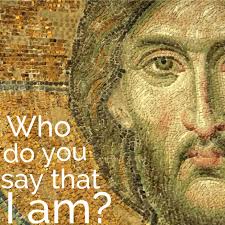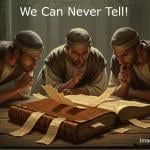Today’s reading from Matthew’s gospel is both famous and infamous. Jesus asks his disciples “Who do people say the Son of Man is?” My guess is that Jesus knows very well what people are saying about him; the ensuing conversation tells Jesus (and us) more about the disciples than Jesus’ reputation. As various disciples report what people are saying, in my imagination I go further to an expanded version:
Some say John the Baptist, but others Elijah, and still others Jeremiah or one of the other prophets. I heard one guy say you were a demon, another one thought you might be an alien. To be honest, Jesus, people don’t agree on who the hell they think you are!
But things get serious when Jesus makes it personal. “But who do you say that I am?”
Peter’s answer that “You are the Messiah, the Son of the living God” is obviously the correct one, given Jesus’ reaction. The infamous part (for non-Catholics) at least comes in Jesus’ expanded comments in the next two verses, where his cryptic and brief comments about building his church on Peter (the rock) and the keys of the kingdom are where Catholics go when asked to provide scriptural support for the Catholic ecclesiastical hierarchy and the papacy. Pretty flimsy textual evidence, if you ask me.
But I’m actually most interested in the last verse from today’s gospel. “He sternly ordered the disciples not to tell anyone that he was the Messiah.” Why not? What’s the big secret? The “Messianic secret” is a big theme in Mark’s gospel, but here it is in Matthew as well. Theologians spend a lot of time speculating about why Jesus didn’t want anyone other than his inner circle to know who he was. But this raises a larger question, one that is particularly relevant in our day and age. How public should one be about one’s spiritual and religious identity? When, if ever, should one’s private faith be on public display?
Several commentators noted during the Democratic National Convention last week that the “f-word” came up in speeches and interactions far more often than usual in a Democratic political event. Usually it’s the Republicans who are wearing their God on their sleeves publicly; I fully expect them to be so during their convention once again this coming week. Democrats are usually so guarded and silent about faith that one can hardly blame secular folks for imagining that progressive/liberal politics and faith are incompatible.
They aren’t. I reconnected a while ago on Facebook with a guy who was my best friend during a year of Bible school in my late teens—we had not been in touch for four decades. During an online conversation about some political/social issue, I mentioned that I am a liberal because I am a Christian. “That’s interesting,” he replied, “I’m a conservative because I’m a Christian.” Neither of us, wisely I think, pursued the matter further.
At what point does political advocacy on the part of Christians distort or compromise the Christian message? Answering this question requires first thinking about “the Christian message” itself. As my exchange with my friend on Facebook shows, well-meaning people of Christian faith can disagree sharply about the implications of their faith as it is lived in the real world on a daily basis.
For instance, Susan might be thoroughly confused about how a professing Christian like Jim can whole-heartedly and full-throatedly worship at the altar of American capitalism despite the devastation it leaves in its wake for millions of our fellow citizens, while Jim is just as confused about how a professing Christian like Susan can be pro-choice and completely supportive of same-sex unions. As progressive Christians and conservative Christians go to war in the public square over whose beliefs and principles are more faithful to the true “Christian message,” we are an offense and stumbling block to those who do not claim to be Christian. And Jesus weeps.
As we have seen throughout the Sunday lectionary this summer, the parables and stories of Jesus consistently stress a central feature of faith that contemporary Christians tend to forget or ignore—the heart of Christianity is subtle, secret, and hidden. Followers of Jesus are likened to yeast and salt, the publican’s private petition for mercy is raised above the Pharisee’s public pronouncements of righteousness, we are told to pray alone behind closed doors to our Father who is in secret, and as we read in today’s gospel reading, Jesus regularly tells his disciples and followers not to spread the word of his miracles or reveal his identity. The secret of lived Christian faith is that it is a way of life, not a set of principles or doctrines. Nor is it a social or political agenda. Given that Christianity is a way of life energized by love, it is to be expected that individual Christians will be as unique and various as human beings themselves are.
One way of describing Christianity as a way of life begins with the prophet Micah’s directive to “do justly, love mercy, and walk humbly with your God,” joined with Jesus’ call to “love your neighbor as yourself.” But justice, mercy, humility and love incorporated in a human life are likely to look quite different depending on who the person is. We are not provided with ways to judge which manner of lived Christian faith is more faithful than another to the “Christian message,” because faith is always interior.
I am the product of a conservative, fundamentalist and evangelical Baptist upbringing, so I often wonder how I came to be as politically and socially liberal on most issues as I am, particularly since people like my friend from Bible school and many of my relatives are products of conservative Christianity and remain closely aligned with its accompanying leanings on political and social issues. My faith journey has been informed by many factors over several decades, including many that I did not choose. I have no reason to believe that I have now arrived at a place where my ever-evolving understanding of what the Lord requires of me is more faithful to the “Christian message” than the often very different understanding my brothers and sisters in faith share whose histories and journeys are very different from mine.
The ever-present danger of Christian political advocacy is that, due to the necessarily public nature of such advocacy, it is very possible for the advocate to mistake a set of political positions or the elements of a social agenda as necessary and universal hallmarks of being truly Christian. It is very easy for the advocate to confuse her or his own purposes and agendas for the message of Christ.
The “true message” of Christianity then quickly becomes something to be argued about in the public arena by persons equally convinced that their own agenda best matches up to the demands of Christian faith, entirely undermining the description of early Christians in the Book of Acts as remarkable because of how much they loved each other. The best firewall against this is to always keep in mind that the “message of Christianity” is the lives lived by those persons who profess the Christian faith in their daily private and public lives. Christianity is a way of life that is not reducible without distortion to a political or social agenda. We are the Christian message.
By all means Christians should be politically active—this is both a right and privilege of citizenship. But do not give the impression or be under the delusion that the right sort of political positions or social policies are what Christianity amounts to. I recommend that Christians distinguish carefully between Christian political advocacy and Political advocacy by persons of Christian faith. The former is to be avoided at all costs, as no person should understand herself or himself as the spokesperson for all Christians or for God. I highly recommend the latter; if my Christian faith is serious, it will have a daily and direct impact on how I engage with others and my society. Do not advocate in the name of Christianity, but advocate as the person that you have become because of your Christian faith.













